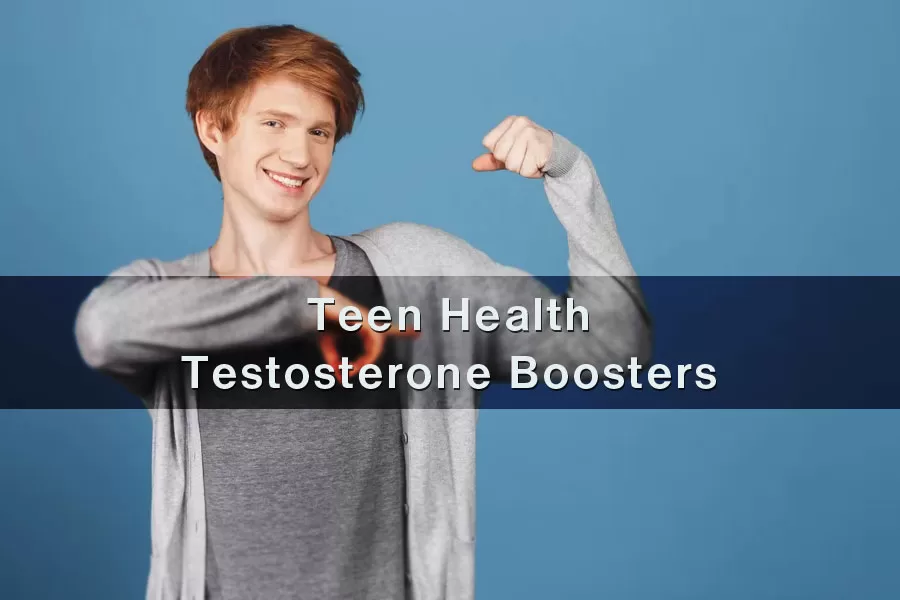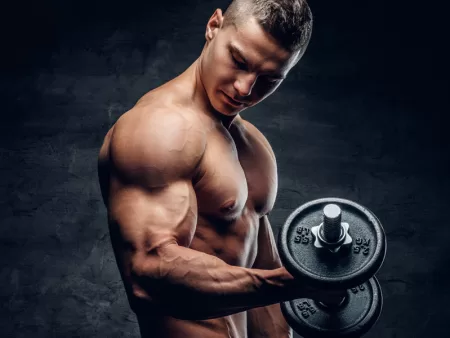
Testosterone is a key player in how teenagers grow up and change. It’s not just about boys getting deeper voices and more muscles; this hormone also helps shape how teens think and feel. Testosterone is behind the sudden height increases and stronger bones. It’s also linked to why some teenagers might feel like riding a rollercoaster of emotions or why they suddenly decide to take up new challenges. It helps the brain with tasks like remembering things and solving problems. For boys, it’s important in developing things like facial hair and plays a big part in making sure their bodies can have children in the future. In short, testosterone is super important for teenagers, helping them transform into adults, both in their bodies and in their minds.
But what really happens when these products meet the ever-changing of a teenager’s body and mind? How do testosterone boosters affect the physical and mental health of teenagers?
Testosterone’s Critical Role in Teenage Development
It not only promotes physical maturation, but plays a crucial role in the holistic development of adolescents. Its influence is not limited to physical traits but extends to the realm of cognitive, emotional, and social maturity. During adolescence, testosterone significantly impacts brain development, affecting neural pathways essential for cognitive skills, emotional intelligence, and social interactions. This hormonal balance is delicate, and the introduction of testosterone boosters can disrupt it, leading to potential shifts in cognitive and emotional growth.
Analyzing the Composition of Testosterone Boosters
D-Aspartic Acid
It tells your brain to create more of a specific hormone that boosts testosterone. It’s like giving a nudge to start the testosterone-making process.
Tribulus Terrestris
This is a plant that’s been used for ages to help with various health issues. Some people believe it can raise testosterone levels, but the science isn’t totally clear on this yet. It’s like an old family remedy that some swear by.
Fenugreek
A spice that you often have in your kitchen cupboard. In addition to making food taste better, it can help prevent testosterone from being converted into estrogen (another important hormone in your body). It’s like a bodyguard that preserves the hormone longer.
Zinc and Magnesium
Your body needs these minerals to function properly in many ways, including testosterone production. Zinc acts as a kind of mechanic, maintaining the smooth functioning of the mechanisms that ensure hormone production. In addition, magnesium is added to keep the process going.
Vitamin D
Frequently referred to as the “sunshine vitamin” due to its availability in sunlight. In addition to being beneficial for mood and bones, there is considerable discussion about its potential to lower testosterone levels.
Ashwagandha
An herb from India that has been used for centuries. It is known for relieving stress, and since stress can reduce testosterone levels, keeping stress in check can help keep hormone levels stable.
Eurycoma Longifolia (Tongkat Ali)
Coming from Southeast Asia, this plant has a reputation for boosting energy and is sometimes used as a natural aphrodisiac. It’s like an energy drink for your testosterone.
Saw Palmetto
This one is often linked to prostate health and is thought to help with keeping testosterone in check by stopping it from transforming into a different hormone.
Shilajit
This sticky substance, found in the Himalayas, is rich in minerals and is said to help increase strength and overall vitality, and may also increase levels of this hormone.
Ginseng
Particularly the Korean Red Ginseng, is like the all-rounder in this group. It’s believed to improve energy and could help with keeping testosterone on the up.
Understanding Long-Term Implications
When discussing the long-term consequences of testosterone booster use among teenagers, it is crucial to consider both the physiological and psychological aspects. Teenage years are a critical period for development, and introducing external hormones can have lasting effects.
Physiological Consequences
- Hormonal Imbalance: Testosterone boosters can disrupt the natural hormonal balance in teenagers. The body may reduce its own production of testosterone in response to external supplements, potentially leading to long-term dependence.
- Growth Impact: Teenagers are still growing, and altering hormone levels can affect this process. For instance, elevated testosterone levels can lead to premature closure of growth plates in bones, potentially stunting growth.
- Reproductive Health: Long-term use of testosterone boosters can adversely affect reproductive health. It can lead to issues such as reduced sperm count and testicular atrophy, impacting fertility later in life.
- Risk of Cardiovascular Issues: Prolonged use of these supplements has been linked to increased risk of cardiovascular problems, including hypertension and heart disease.
Psychological Consequences
- Mood Fluctuations and Mental Health: Testosterone influences mood and mental health. Its elevated levels, especially in the volatile teenage years, can lead to mood swings, aggression, and even long-term mental health issues like depression.
- Body Image Disorders: Reliance on testosterone boosters for physique enhancement can contribute to body image disorders. Teenagers might develop an unhealthy relationship with their body and self-esteem, leading to issues like muscle dysmorphia.
Dependency and Substance Misuse
Dependence on testosterone boosters can set a precedent for other substance use. Teenagers might turn to other supplements or even illicit drugs in pursuit of body or performance goals.
Social and Behavioral Impacts
Excessive use of testosterone boosters can affect social interactions and behavior. It may lead to increased aggression or risk-taking behaviors, impacting social relationships and life choices.
Safe and effective alternatives to testosterone boosters for teenagers
For teens who want to get stronger and develop their bodies safely, there are good ways to do so without the need for testosterone boosters. First, it is important to eat well. This means eating plenty of proteins like chicken and beans, healthy fats from foods like avocados, and plenty of energy-providing foods like whole grains, fruits, and vegetables. Regular exercise is also important. This could be weight lifting, push-ups, running, swimming or even yoga. All these activities help build muscles and keep your body in shape.
Getting enough sleep is also very important. Teenagers need about 8-10 hours each night to stay healthy and maintain their growth. Stress management is another important task. Relaxing, pursuing hobbies, and hanging out with friends can help reduce your stress levels. Staying hydrated by drinking plenty of water also helps, especially during workouts.
It is also very important for teenagers to avoid bad habits such as smoking, drinking alcohol or using drugs. These things can harm a growing body. And before starting any new diet or exercise program, it’s always a good idea to talk to your doctor to get the best advice. Finally, while exercise is great, it’s important not to overdo it. The body needs time to rest and recover. By focusing on these healthy habits, teens can develop and grow in a safe and natural way.
Conclusion
The use of testosterone boosters among teenagers presents a complex and multi-faceted issue. While these supplements are sought after for their potential benefits in enhancing physical performance and body image, their impact on adolescent health cannot be overlooked. Teenagers are at a critical stage of physical and psychological development, and the introduction of hormone-altering substances poses significant risks. Potential consequences range from hormonal imbalance to long-term health problems.
It is critical that teens and their caregivers prioritize natural and safe approaches to health and wellness. A balanced diet, regular exercise and a healthy lifestyle are fundamental elements that naturally support hormonal health and overall well-being. But a consultation with a doctor will always help you decide for sure whether you should take testosterone boosters
FAQs
No, they shouldn’t. Just because a friend says something is cool doesn’t mean it’s safe or good for your body. Everyone’s body is different, and for teens, it’s better to stick to natural ways like exercise and good food to get stronger.
It’s best to talk to a doctor about this. Sometimes it just takes time to grow, and a doctor can check if everything is okay. Plus, they can give tips that are right for their body.
Yes, absolutely! Push-ups, along with other exercises, and eating protein-rich foods are great for building strength and muscles naturally. It’s a healthy way to get stronger.
Not really. Being a top athlete is about training hard and eating right, not taking shortcuts with boosters. Using them can have side effects that might hurt their athletic goals instead of helping.







